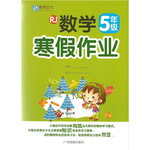题目内容
had invited 50 guests to the party,but actually twice_____came.
A.more than B.as many C.as much D.less than
D
省略了as 50 guests。

 黎明文化寒假作业系列答案
黎明文化寒假作业系列答案 寒假天地重庆出版社系列答案
寒假天地重庆出版社系列答案 C
Monday: Here I am, in the middle of nowhere. This camping trip idea is not getting off to a very good start. It’s raining and the tent leaks (漏). The hiking seemed to take forever, and I still can’t understand how it could all have been up hill! How did I ever let my brother persuade me into doing this? When we get home—if we ever get home—he’s going to have to do something great to get back on my good side. Maybe he should sponsor (赞助) a shopping spree(狂购)at the mall!
Tuesday: Things are looking up. The sun came out today, so we were able to leave the tents and dry out. We’re camped at the edge of a small lake that I couldn’t see before because of the rain and fog. The mountains are all around us, and the forest is absolutely beautiful. We spent most of the day dragging out everything out of our backpacks or tents and putting it where the sun could dry it out. Later in the afternoon we tried to catch the fish for dinner, but the fish were smarter than we were. At night we built a fire and sang songs happily.
Wednesday: We hiked to the far side of the lake and climbed to the top of a small peak. From there we could see how high the other mountains were and how far the forest spread around us. On the way up we passed through a snowfield!
Thursday: I caught my first fish! We followed the stream that fed the lake. After about two miles, we came to a section (区域) that Carol said looked “fishy”. She had a pack rod (竿) , which can be carried in a backpack. I asked to cast (投掷) it, and I caught a fish on my first try. Carol caught a few more. But they were just too pretty to eat for lunch, so we put them back in the stream.
Friday: I can’t believe we are going home already. It will be nice to get a hot shower, sleep in a real bed, and eat junk food, but the trip has been wonderful. We’re already talking about another camping adventure next year where we canoe (乘独木舟) down a river. It’s hard to believe, but I think this city girl has a little country blood in her veins.
【小题1】The writer went on this camping trip because ____________.
| A.she enjoyed camping. | B.she wanted to go fishing. |
| C.she was influenced by her brother. | D.she was tired of staying home. |
| A.hiked along the lake. | B.dried out her belongings. |
| C.climbed the mountain. | D.caught the fish for dinner. |
| A.she could not afford to buy a regular fishing pole. |
| B.she needed it to get their food. |
| C.she thought the writer of the journal might need it. |
| D.she expected to go fishing while they were hiking. |
| A.go on another camping trip. |
| B.invite Carol to go fishing together. |
| C.make her brother buy her something. |
| D.persuade her brother to go camping. |
For some people, music is no fun at all. About four percent of the population is what scientists call “amusic.” People who are amusic are born without the ability to recognize or reproduce musical notes (音调). Amusic people often cannot tell the difference between two songs. Amusics can only hear the difference between two notes if they are very far apart on the musical scale.
As a result, songs sound like noise to an amusic. Many amusics compare the sound of music to pieces of metal hitting each other. Life can be hard for amusics. Their inability to enjoy music set them apart from others. It can be difficult for other people to identify with their condition. In fact, most people cannot begin to grasp what it feels like to be amusic. Just going to a restaurant or a shopping mall can be uncomfortable or even painful. That is why many amusics intentionally stay away from places where there is music. However, this can result in withdrawal and social isolation. “I used to hate parties,” says Margaret, a seventy-year-old woman who only recently discovered that she was amusic. By studying people like Margaret, scientists are finally learning how to identify this unusual condition.
Scientists say that the brains of amusics are different from the brains of people who can appreciate music. The difference is complex, and it doesn’t involve defective hearing. Amusics can understand other nonmusical sounds well. They also have no problems understanding ordinary speech. Scientists compare amusics to people who just can’t see certain colors.
Many amusics are happy when their condition is finally diagnosed (诊断). For years, Margaret felt embarrassed about her problem with music. Now she knows that she is not alone. There is a name for her condition. That makes it easier for her to explain. “When people invite me to a concert, I just say, ‘No thanks, I’m amusic,’” says Margaret. “I just wish I had learned to say that when I was seventeen and not seventy.” (335 words)
【小题1】Which of the following is true of amusics?
| A.Listening to music is far from enjoyable for them. |
| B.They love places where they are likely to hear music. |
| C.They can easily tell two different songs apart. |
| D.Their situation is well understood by musicians. |
| A.dislikes listening to speeches |
| B.can hear anything nonmusical |
| C.has a hearing problem |
| D.lacks a complex hearing system |
| A.her problem with music had been diagnosed earlier |
| B.she were seventeen years old rather than seventy |
| C.her problem could be easily explained |
| D.she were able to meet other amusics |
| A.Amusics’ strange behaviours. |
| B.Some people’s inability to enjoy music. |
| C.Musical talent and brain structure. |
| D.Identification and treatment of amusics. |
Neighbours play an important role in our lives. Their lifestyles, friends, and social habits can have a strong influence on our lives. It is a good idea to get to know the people next door or across the street to develop a community (社区) of support and safety. You never know when a neighbour will find a stranger walking around your house, or you may want to leave an extra key at their house in case someone in your family gets locked out.
How do you get along with your neighbours? Here are some tips for building a better relationship with your neighbours.
Point ①…Proper greetings can make your neighbours remember your name and pave (铺) the way for more meaningful future meetings. Don’t stay too long, though, or you’ll wear out your welcome!
Point②…If your neighbour is building a pool, offer a few hours of help. Besides, you never know when the favor might be returned.
Point③…If you hear that someone who live close to you has had an accident, take over a hot meal or some fruit. Your action will add a special touch during a difficult time.
Point④…Invite your neighbours over for a cup of coffee in December or an Easter egg hunt in spring. A backyard barbecue (烧烤) can be a great way to share food and fun.
Your neighbours may annoy you at times, but they are like family in many ways. Appreciate their strengths and overlook their weaknesses, and everyone will get along just fine.
【小题1】What is Paragraph 1 mainly about?
| A.The possibility of a good community. |
| B.How to get to know your neighbours. |
| C.How to influence your neighbours. |
| D.The importance of neighbours. |
| A.Offering to help your neighbours if they need help. |
| B.Having a very long conversation with a new neighbour. |
| C.Inviting your neighbours over for a backyard barbecue. |
| D.Preparing a hot meal for a neighbour who is going through a difficult time. |
a. Invite your neighbours over. b. Lend a helping hand.
c. Go over and introduce yourself. d. Offer support.
| A.①-c②-b③-d④-a | B.①-c②-b③-a④-d |
| C.①-b②-c③-d④-a | D.①-b②-c③-a④-d |
| A.explain why it is good to get along well with others |
| B.give us some tips on how to support our neighbours |
| C.tell us how to get along with our neighours |
| D.advise us to be nice to our neighbours |